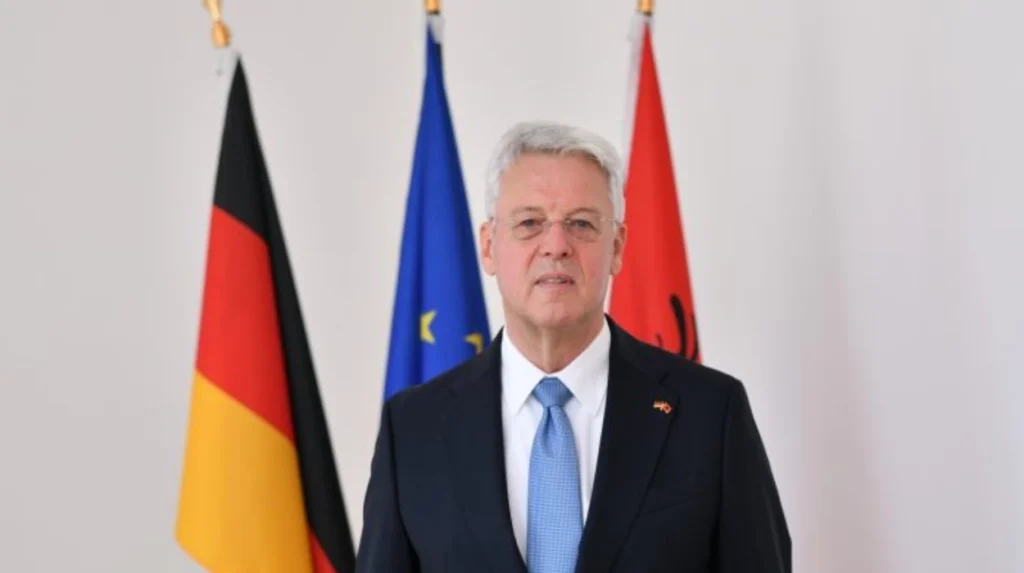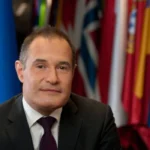Germany has urgently called for a transparent and merit-based process in the selection of the new leadership of the Special Prosecution Office (SPAK). German Ambassador Karl Bergner publicly emphasized the importance of independence and transparency in this crucial judicial procedure that reflects broader concerns about rule of law and governance standards. His statements highlight Germany’s ongoing commitment to supporting judicial integrity in Albania and its European Union integration aspirations.
The German Embassy in Tirana posted Ambassador Bergner’s reaction to the initiation of the selection process for SPAK’s new head. He praised the tenure of outgoing SPAK head Altin Dumani, acknowledging his remarkable contributions in the fight against corruption and organized crime. The ambassador detailed how Dumani’s leadership strengthened public trust and reinforced international partnerships, stating
“The great trust of the Albanian population and international partners in the work of SPAK emphasizes this in an impressive way.”
Emphasis on Rule of Law and EU Integration
Ambassador Bergner clearly linked the SPAK leadership selection to broader rule of law concerns, which are pivotal benchmarks for Albania’s path toward EU membership. He underlined that
“The independence of the judiciary, which should be reflected both in the selection process that has just begun, as well as in the daily actions of the executive and legislative institutions, is a key criterion for Germany in terms of the rule of law and Albania’s preparation for membership in the European Union.”
This statement underscores Germany’s stance that the credibility and effectiveness of justice institutions, especially SPAK, play a critical role in Albania’s European integration efforts. It highlights the need for a transparent, impartial process free from political or external influence, ensuring that the new SPAK leadership is chosen solely based on merit.
The Selection Process and International Oversight
The selection process, undertaken by Albania’s High Prosecutorial Council, has attracted close international attention. Germany’s call acts as a reminder that European and Western partners remain vigilant about the judicial reforms and anti-corruption measures in the Western Balkans region. Bergner’s message implicitly cautions against any opacity or undue interference that could undermine SPAK’s reputation as a driving force against corruption.
Besides the German government, other international actors, including US representatives, have also voiced their interest in how SPAK’s leadership transition will unfold. A US Charge d’Affaires underscored that international partners will “closely follow the process of selecting new heads of justice institutions,” reflecting the heightened diplomatic spotlight on Albania’s judicial reforms.
SPAK’s Role in Albania’s Judicial Reform and Anti-Corruption Fight
SPAK is a specialized prosecutor’s office with the mission to prosecute high-level corruption and organized crime cases in Albania. It has earned regional and international acknowledgment for its active role in promoting transparency and accountability in government institutions. The leadership and independence of SPAK are therefore crucial for both domestic governance and foreign relations.
Under dumani’s previous mandate, SPAK reportedly made substantial strides, contributing to a stronger rule of law environment. Ambassador Bergner’s praise highlights how SPAK’s leadership directly correlates with advancing anti-corruption progress. His statement serves both as recognition of past success and as a caution about maintaining these gains through a fair selection process.
Broader Context: Germany’s Role in Balkan Stability and Rule of Law
Germany remains a committed partner in the Western Balkans through various political, economic, and judicial support programs. The SPAK leadership issue is one facet of Germany’s broader involvement in promoting democratic stability and adherence to rule of law standards in the region.
This is consistent with Germany’s recent actions regarding Bosnia and Herzegovina, where it has supported EU sanctions against separatist threats and insisted on respect for constitutional integrity. The focus on transparent governance and judicial independence in Albania aligns with similar principles Germany emphasizes throughout the Balkans, reinforcing regional stability and EU-compatible reforms.
Challenges and Expectations Ahead
Despite the optimism raised by calls for transparency, the selection of SPAK’s new head faces challenges from political pressures and vested interests that have historically affected Albania’s judiciary. Germany’s intervention aims to safeguard this process and ensure that it meets the expectations of both the Albanian people and the international community.
By insistence on a merit-based approach, Germany signals its commitment to preventing politicization and external influences that could derail judicial independence. This approach also intends to strengthen public confidence, a critical element given SPAK’s sensitive role in prosecuting corruption cases involving powerful political and economic actors.
Germany’s call for transparency and meritocracy in SPAK leadership selection represents a significant diplomatic statement reinforcing key principles of judicial independence and rule of law in Albania. Ambassador Karl Bergner’s remarks underline the essential link between effective judicial institutions and Albania’s European integration. International watchfulness from Germany and other partners continues to place Albania’s judicial reforms under critical scrutiny, promoting accountability and trust in the process of selecting SPAK’s new leader.







